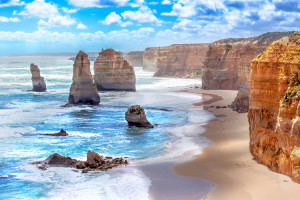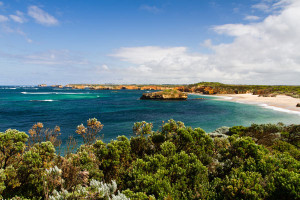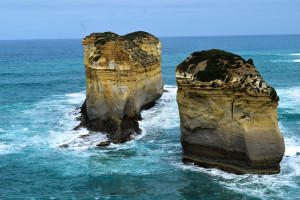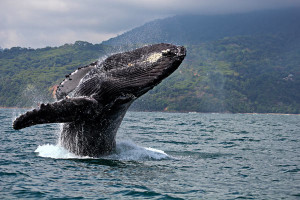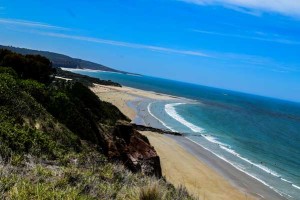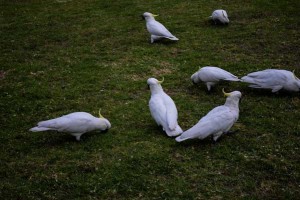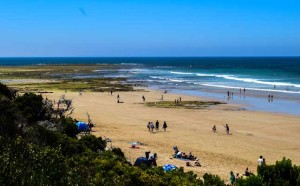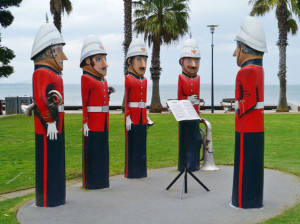The Great Ocean Road (GOR) spans for 243 km along Australia’s southeastern coast between Torquay and Allansford in the Australian state of Victoria.
The road is an Australian National Heritage site that was built between 1919 and 1932 by soldiers returning from World War I.
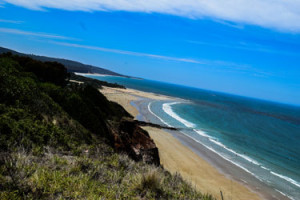
The road is dedicated to those who lost their lives fighting in that war, thus making it the largest war memorial in the world.
The road traverses a particularly scenic part of Australia. Hugging the coastline, drivers will find themselves travelling through rainforests, over beaches, and along cliffs with stunning panoramic views.
Also along the two-lane road are a number of prominent Australian landmarks, including the Twelve Apostles limestone stack formations, Great
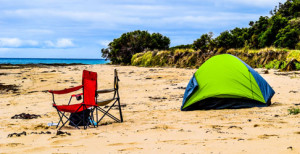
Beaches
Otway National Park, Port Campbell National Park, Loch Ard Gorge, Grampians National Park, and Port Fairy.
Seaside Towns Along the Great Ocean Road
In addition to the beautiful natural parks and sites along the road, the GOR also offers a number of beautiful, quaint seaside towns that make for a great place to stay, visit, enjoy a meal, or simply pass through during you trip along the road.
There are the seaside towns of Torquay, Lorne, and Apollo Bay, which offer stunning beaches, water sports, and rainforest scenery.
Visitors can also take in Victoria’s rich maritime past in the more historic towns of Warrnambool, Port Fairy, and Portland.
These towns offer a little glimpse into the Australian maritime village life. They are filled with quaint fishing wharves, well preserved colonial buildings, and maritime museums.
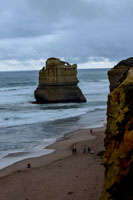 Twelve Apostles Limestone Stack Formations
Twelve Apostles Limestone Stack Formations
The Twelve Apostles is a collection of limestone stacks off the shore of Port Campbell National Park.
The stacks are around 275 km west of Melbourne, right off the Great Ocean Road in Victoria, Australia.
The landmark received its name from the limestone stacks located in close proximity to each other right offshore.
Despite its name, there only ever existed nine stacks (it was renamed the 12 Apostles in 1922 for tourism purposes) and today, only eight “apostles” remain; the elements have taken their toll on the fragile limestone stacks over time.
The ninth stack collapsed in July of 2005. The stacks were formed over time by erosion when the powerful ocean gradually eroded the limestone to form caves, which in turn eroded to form arches, which then collapsed leaving rock stacks as high as 50 metres behind. Eventually, this process of erosion will eliminate the stacks completely.
The Twelve Apostles are also a part of the greater Twelve Apostles Marine National Park, which covers 7500ha and 17 km of 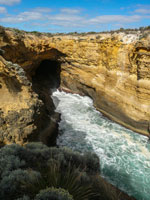 breathtaking coastline.
breathtaking coastline.
The park is home to some of the area’s most impressive underwater scenery, including additional arches, canyons, fissures, gutters, and deep sloping reefs, all of which have been formed by the constant pounding this coastline receives from the ocean.
These underwater structures provide habitat for abundant underwater wildlife, which in turn provides food for a number of above water creatures. The Twelve Apostles are a must see for those travelling the Great Ocean Road.
In addition to the fascinating stacks, the golden cliffs lining the coastline provide for sunning vistas of the ocean and the stacks themselves. It is a truly breathtaking stop on a breathtaking road!
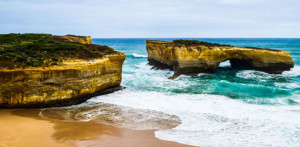
London-Arch
London Arch
The London Arch is an offshore natural arch formation within the Port Campbell National Park. The stack was formed by erosion and until 1990, there existed a complete double-span natural bridge.
However, the span closer to the shoreline collapsed on January 15, 1990, thus leaving a detached, single arch bridge structure just offshore. Like most places in the area, the arch, as well as the surrounding coastline, is lined with golden cliffs and a horizon of deep blue water, making the London Arch an incredibly scenic spot, even if you cant walk out on it anymore.
Loch Ard Gorge
The Loch Ard Gorge is only a short three minute drive west of the Twelve Apostles. It is a beautiful, narrow inlet with golden cliff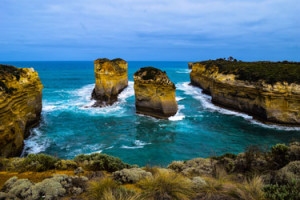 walls and vibrant blue water.
walls and vibrant blue water.
The gorge gets its name from the clipper ship Loch Ard, which ran aground on Muttonbird Island on June 1, 1978. According to legend, of the 54 people on board, only two survived, fifteen year old Tom Pearce and seventeen year old Eva Carmichael. When Pearce was washed ashore after the wreck, he heard Carmichael’s cries for help.
After saving her and bringing her ashore, Pearce climbed the gorge to alert local pastorialsts. The two teenage survivors have been immortalized at the nearby Island Archway, which collapsed in 2009, leaving behind to unconnected rock pillars.
These pillars have now officially been named Tom and Eva, after Pearce and Carmichael.
The Loch Ard Gorge is a great place for history enthusiasts. The gorge, which can be accessed by stairs to the beach and a pathway to the eastern side of the gorge, has numerous plaques and a small museum detailing the site’s unique and interesting history.
There is also a small history where most of the casualties of the shipwreck have been buried. There are also a number of viewing areas along the pathways down to the gorge, which are perfect areas for taking photographs of the beautiful scenery.
Gibson Steps
The Gibson Steps are the first sightseeing stopoff in the Port Campbell National Park for those heading westward along the 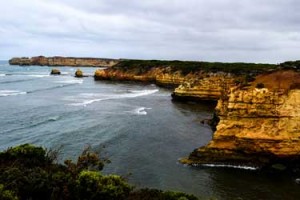 Great Ocean Road. The steps are only a short, two minute drive from the Twelve Apostles. The area gets its name from the staircase leading down the cliff face to the beach.
Great Ocean Road. The steps are only a short, two minute drive from the Twelve Apostles. The area gets its name from the staircase leading down the cliff face to the beach.
The area offers a beautiful beach right at the bottom of a beautiful, sheer cliff. The beach at the bottom offers a wonderful area for a beach day and the top of the cliff offers a wonderful viewpoint of the sea and beach below.
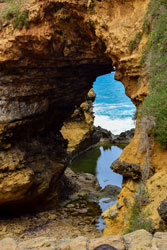 The Grotto
The Grotto
The Grotto is a unique sinkhole geological formation located on the Great Ocean Road. There are stairs that lead down to the Grotto, which is essentially a rock tunnel leading to the sea.
From the end of the tunnel, near the foot of the stairs visitors are provided a unique view of the water, framed by the golden rock of the Grotto and the unique light that funnels through the tunnel.
It is a picturesque place, ideal for photographers or anyone interested in taking in a beautiful sight!
The GOR really does have something for everyone.
It offers beautiful scenery, outdoor recreation, both on sea and in the forest, fine dining, shopping, and a number of cultural and historical attractions.
If you head to Australia, you have to tour the Great Ocean Road
 TravellerHints!
TravellerHints! 


